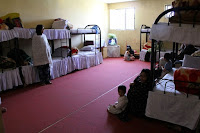As an introduction to our new project in the women’s prison
in Herat, here is an account from my first
experience in the prison in 2011 (a blog report that I never posted!).
* * *
April 2011
One of the most beautiful and devastating experiences we had
in Afghanistan was visiting the women’s prison.
The prison is located on Prison Street. The front gate is flanked by gigantic
cement planters filled with red pelargonia flowers overrun by barbed wire.
Rather symbolic.
All the girls of Simorgh Theatre have their arms marked by the prison
guard with signature and date in large red permanent marker across their
forearm. This is so they can get out again! And not get confused for a prisoner.
Joanna and I are spared the markings, no need.
There are little children running around. They come right up to me and surround me, unabashed, unafraid, getting close to me with their little bodies, into my arms, face to my face, and hold my hands. So sweet. They’re two, three, maybe four years old.
 The children stay with their mothers in the prison until age
seven and then go to relatives (or orphanage?). It’s not clear to me who
decides this, does the mother have any say? Generally, as I understand,
according to Muslim law, the child belongs to the mother until age seven and
after that the father takes over and the mother no longer has any right to her
children. I saw a couple of girls around age 10 or 12 as well, but otherwise
they all looked under five. The presence of children is startling and
disturbing, but also joyous – making it less oppressive, less like a prison. Still, it’s a prison. It’s beneficial
for the children to be with their mothers, but on the other hand it must be
detrimental to their psychological well-being to spend their first formative
years behind bars.
The children stay with their mothers in the prison until age
seven and then go to relatives (or orphanage?). It’s not clear to me who
decides this, does the mother have any say? Generally, as I understand,
according to Muslim law, the child belongs to the mother until age seven and
after that the father takes over and the mother no longer has any right to her
children. I saw a couple of girls around age 10 or 12 as well, but otherwise
they all looked under five. The presence of children is startling and
disturbing, but also joyous – making it less oppressive, less like a prison. Still, it’s a prison. It’s beneficial
for the children to be with their mothers, but on the other hand it must be
detrimental to their psychological well-being to spend their first formative
years behind bars. The facilities, however, are so much more pleasant than one might expect of an Afghan prison, or any prison (certainly not like jails in the US). I think I had imagined dark, dank cells with dirt floors and perhaps rats, like dungeons. But these were more like dormitories. The floors are carpeted in dark red, and the rooms are large with bunk beds and colorful blankets and a TV set. The doors are left wide open, but perhaps that’s only for our tour. Then there are the children running about. There’s a playroom for them filled with stuffed animals and toys. And for the women there are occupational activities such as tailoring, embroidery, hair dressing and weaving. Another aspect that adds to a less prison-like atmosphere is the fact that the women don’t wear uniforms, they’re dressed in regular clothes of varying colors (i.e., regular Afghan clothing: tunic with pants, or dress, and headscarf or chador (long black sheet)).
But, the inescapable truth is they are in prison. And
cannot leave. And it has severe social consequences.
Our girls perform their show about domestic abuse,
specifically centering on conflict between a mother-in-law and her young
daughter-in-law. Domestic abuse is
rampant in Afghanistan and not only from the husband but often from his entire
family (mother-in-law, brothers, uncles, etc.), and the young bride is
sometimes treated as a slave. Many of the young women at the prison are there
because they ran away from home – from an abusive husband and/or abusive
mother-in-law. Running away from home – whether your parents’ or your husband’s
-- is a crime in Afghanistan. A so
called moral crime. Some have fled to escape the fate of an impending forced
marriage, or to marry the one that they love, others to get away from an
abusive home. The brutality of abuse, physical and mental, is beyond the
imaginable. It is so severe that
young girls and women, married off as slaves to an older man and his family,
burn themselves to death. In the
Herat area last year there were about 100 recorded self-immolations. That’s two
a week! And yet, if these women run away, they are the ones who go to jail.
Given their circumstances, prison is a better place for many of these young
women. Indeed, having shamed the family by running away, they may very well get
killed once they leave prison.
And yet, they are in prison, when they have done nothing
wrong but eloping with their lover whom they wish to marry, or escaping an
abusive home! They have been
deprived of their freedom for nothing.
This is so wrong and deeply upsets my sense of justice. But most everything involving women in
Afghanistan will upset one’s sense of justice and fairness.
 Our show is very well-received. The women laugh a lot and
break out in applause, spontaneously at certain dialogue. For instance, when a
character speaks to the mother-in-law in a dream and talks about how it is
possible to change. This is when I wish I understood exactly what was being
said when (the show is in Dari) – what prompted them to clap? After the
performance, we ask for feedback from the audience. The women say we should
bring the show out to the villages. One woman advocated fiercely and
enthusiastically for this. Afterwards Joanna and I go to shake hands with some
of the women in the audience. I hunch down to say hello, “Tashakor, khob bud”?
I can’t say much more, but smile with my hand to my heart. One woman who is
further back in the audience calls out: “What is your name?” Another says: “My
friend says thank you very much!”
Our show is very well-received. The women laugh a lot and
break out in applause, spontaneously at certain dialogue. For instance, when a
character speaks to the mother-in-law in a dream and talks about how it is
possible to change. This is when I wish I understood exactly what was being
said when (the show is in Dari) – what prompted them to clap? After the
performance, we ask for feedback from the audience. The women say we should
bring the show out to the villages. One woman advocated fiercely and
enthusiastically for this. Afterwards Joanna and I go to shake hands with some
of the women in the audience. I hunch down to say hello, “Tashakor, khob bud”?
I can’t say much more, but smile with my hand to my heart. One woman who is
further back in the audience calls out: “What is your name?” Another says: “My
friend says thank you very much!”Two little children kiss my hand with a ritual of placing their cheek, then the other cheek, then their forehead on my hand (and then kiss). An old woman kisses my cheeks and forehead and hugs me closely and strongly.
The women disappear behind the prison door manned by two
female guards in uniform. Some then appear behind the bars of a window, and our
girls gather to talk to them. “Where are you from? Are you married? Children?”
And eventually the question – “Why are you here in prison?”
 One says she killed her husband. Or rather that is what she
was put in here for. She didn’t actually do it, but was accused by the
husband’s brother. And that’s all it takes. A woman has no voice to defend
herself. And even if someone did kill her husband she may have had cause,
considering how horribly many women are treated. But most of them are in prison simply for running away (as described above).
One says she killed her husband. Or rather that is what she
was put in here for. She didn’t actually do it, but was accused by the
husband’s brother. And that’s all it takes. A woman has no voice to defend
herself. And even if someone did kill her husband she may have had cause,
considering how horribly many women are treated. But most of them are in prison simply for running away (as described above).
The women behind the bars of the window told the girls they
can’t speak further about why they’re there because they’ll cry if they do, and
the guards are there (they don’t feel comfortable to speak, or cry, in front of
them).
The children sing us a song. They are lined up neat and tidy
in a little square. We think, “Oh, how sweet that they sing for us.” But as we
learn later the song they’re singing is about being abandoned and homeless! I
decide to give the children the balloons I had bought the other day and I still
had in my bag.
Our girls are really affected by this visit and especially
because of the children. They are visibly taken and somber on the ride home.
“The children…” one girl starts to say and breaks down crying. Another girl is
crying silently all the way home. This whole experience touched her, I realize,
on a very personal level. She’s facing an arranged marriage, and here are all
these women who have escaped forced marriages either by killing the husband or
running away. She sees herself in these women, her own future perhaps. Or at
the least she acutely understands and feels their plight. Her parents want her
to marry someone she doesn’t want to marry, but they insist and are not
listening to her. She’s been very sad the last few days. I’m told she’s asking
to join us a lot on our excursions, because she wants to get away from home.
She’s 17, she’s not ready to lose her freedom. That’s it, her life will
completely change. And there’s nothing we can do, to help her. I wonder what’s
going to happen.
Our play about a mother-in-law who treats her son’s young
wife badly has a happy ending. The mother-in-law in the end understands the
error of her ways and reconciles with her daughter-in-law. They find a way to
live happily together. Later I learn that one of the women in the prison came
up to one of our girls and expressed how much she wished her mother-in-law had seen this play. She was in prison because she had killed her mother-in-law.
-----------------
P.S.
The girl in our troupe facing a forced marriage got a happy
ending too. So far. Her parents relented and she did not have to marry. She has
been able to continue with the theater. And she’ll be joining us on this new
project in the prison!
















No comments:
Post a Comment